The karst mountains and countryside around YangShuo, GuangXi province ...
[video v=bC5QHEJcRog]The LongJi rice terraces, YunNan province ...
Plus more videos ...
Live more ...
The karst mountains and countryside around YangShuo, GuangXi province ...
[video v=bC5QHEJcRog]The LongJi rice terraces, YunNan province ...
Plus more videos ...
With EpicGlobe Walks ..
[video v=WoZrHYSsVac]Huangyao Ancient Town, GuangXi province, is a well-preserved historic town known for its ancient architecture, cobblestone streets, and serene environment. Here’s a detailed guide to everything you need to know about this hidden gem.
Huangyao Ancient Town has a history dating back over 1,000 years, with its origins traced to the Song Dynasty (960–1279 AD). It flourished during the Ming (1368–1644) and Qing (1644–1912) dynasties as a bustling commercial hub due to its strategic location along trade routes. The town was named after the dominant Huang and Yao families who settled here. Unlike many other ancient towns in China, Huangyao has retained much of its original charm, avoiding over-commercialization.
The town is a living museum of Ming and Qing dynasty architecture, with over 300 well-preserved ancient buildings. Key architectural features include:
Here’s a detailed look at the must-see spots in Huangyao:
Huangyao is not just about sightseeing; it’s also a place to immerse yourself in local culture:
Huangyao’s food is simple yet flavorful, reflecting the town’s rural roots. Must-try dishes include:
Huangyao is located about 200 kilometers from Guilin and 120 kilometers from Yangshuo. Here’s how to reach the town:
Huangyao offers a range of accommodations, from budget guesthouses to boutique hotels. Staying overnight is highly recommended to experience the town’s peaceful atmosphere after the day-trippers leave. Options include:
Huangyao Ancient Town is a perfect destination for travelers seeking:
Whether you’re a history buff, a photography enthusiast, or simply looking for a tranquil retreat, Huangyao Ancient Town promises an unforgettable experience.
With EpicGlobe Walks ...
[video v=6Ec_lQzcPbM]The Longji Dragon’s Backbone Rice Terraces, Longsheng County, Guangxi Province, are one of the most breathtaking agricultural landscapes in the world. These terraces, which resemble a dragon’s scales, were first built during the Yuan Dynasty (1271–1368) and have been maintained by the local Zhuang and Yao communities for centuries. The terraces are a testament to human ingenuity and harmony with nature.
The Longji Rice Terraces are stunning year-round, but the best times to visit are:
The Longji Rice Terraces are approximately 100 kilometers from Guilin. Here’s how to reach them:
The Ping’an Terraces are the most accessible and popular section of the Longji Rice Terraces. Highlights include:
The Jinkeng Terraces are less crowded and offer stunning views. Key spots include:
There are several accommodation options near the terraces, ranging from guesthouses to boutique hotels. Popular choices include:
The Longji Dragon’s Backbone Rice Terraces are a must-visit destination for nature lovers, photographers, and cultural enthusiasts. Whether you’re hiking through the terraces, learning about local traditions, or simply soaking in the breathtaking views, this UNESCO World Heritage Site promises an unforgettable experience.
With Silberventures ...
[video v=BeJJfOnLnQ8]Very beautiful scenes - don't miss it ...
[video v=Aqp5p6N3-gE] Plus more videos ...
With See World ...
[video v=1mPcJ3232MI] Plus more videos ...
With Beijing Old Liu ...
[video v=GzlvcaG8LTY]Goose Spring, also known as Equan, is a renowned scenic spot in GuangXi Province, China. Known for its crystal-clear waters, lush greenery, and serene environment, Goose Spring offers a perfect getaway for nature lovers and those seeking tranquility.
Location: Bama Yao Autonomous County, HeChi City, GuangXi Province, China.
Public Transport:
Goose Spring offers several attractions for visitors to explore:
Visitors can engage in a variety of activities at Goose Spring:
Several small restaurants and snack stalls are available around Goose Spring, offering local GuangXi cuisine and refreshments. It's also a good idea to bring your own snacks and water.
Goose Spring (Equan) in GuangXi is a tranquil and beautiful destination that offers a mix of natural beauty, serene environment, and cultural experiences. Whether you're a nature enthusiast, hiker, or simply looking for a peaceful retreat, Goose Spring provides an unforgettable experience.
With Valeriy Blank ...
[video v=nHYGBXVl7to]With All About Country ...
[video v=2GBmxbg2HYU]Description: Guilin Seven Star Park is one of the city's most popular attractions, offering a blend of natural scenery, cultural landmarks, and family-friendly activities. ... more ...
Li River cruise, GuiLin to YangShuo, GuangXi province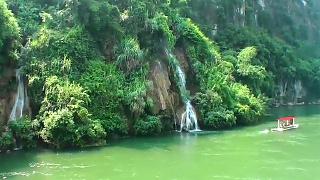
With CostiTravel ...
With Dazza’s Adventures and Travels ...
Delicious street food in NanNing, GuangXi
With JacobysJourneys ...
This is NanNing city, GuangXi province
With Fly Over China ...
NanNing, provincial capitol of GuangXi province
With Walk East ...
The beautiful DeTian Waterfalls, GuangXi province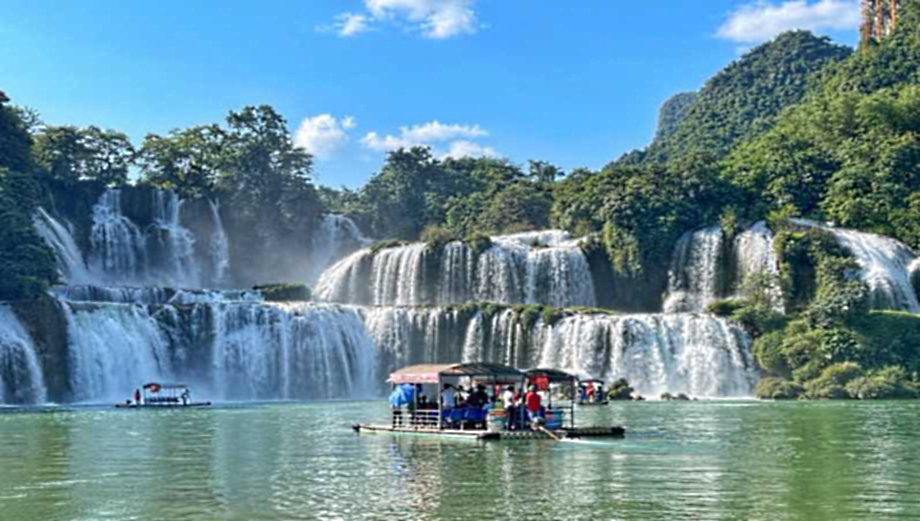
DeTian Falls is the name of two waterfalls that straddle the international border between China and Vietnam, in the Karst hills of DaXin County. This film contains awesome drone footage. Don't miss it ! With Little Chinese Everywhere ...
Beautiful YangShuo, GuangXi province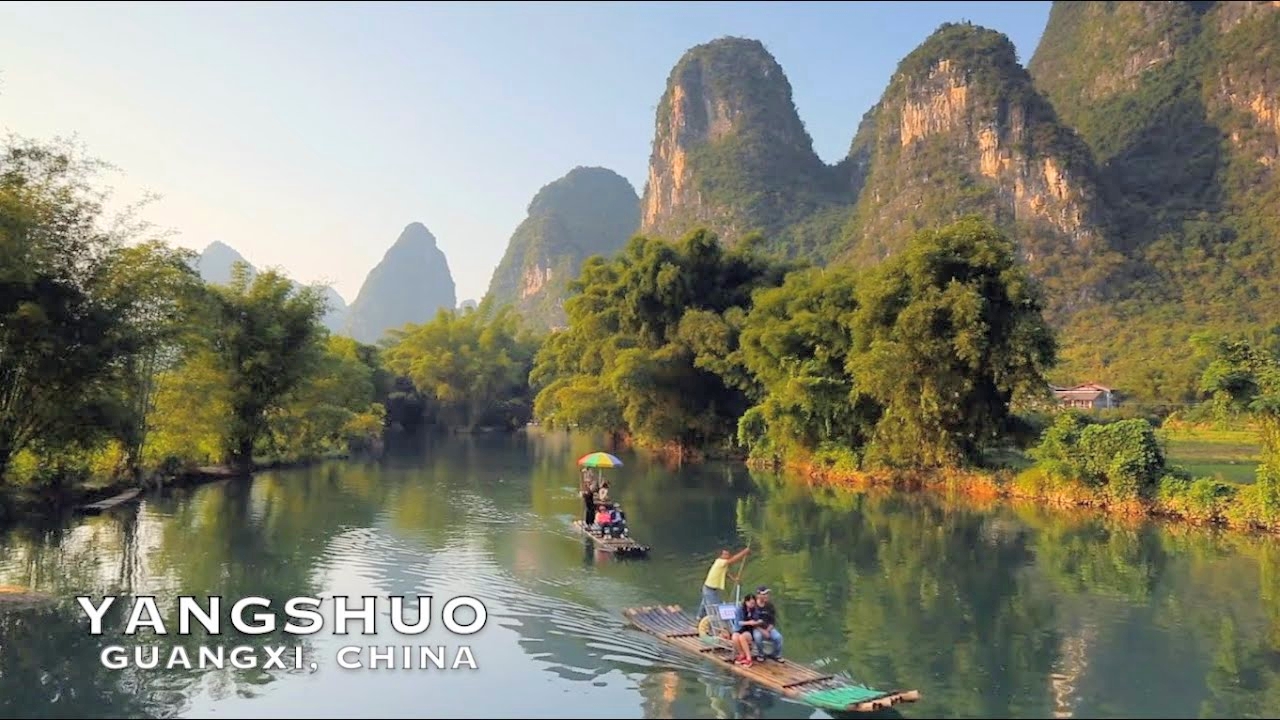
With JacobysJourneys ... Bonus film with BeijingBuzzz ...
NanNing, capital city of GuangXi province
With DuckTravel ... With Walk East ... With Chao's Travel Log ..
The awesome karst mountain scenery of GuangXi province
With Little Chinese Everywhere ... Bonus film - with A German In China ...
The magical landscape and culture of GuiLin, GuangXi province
With Emil Sahlén ...
A little look at YangShuo, GuangXi province
With Little Chinese Everywhere ...
NanChang walking tour, GuangXi province
With Walk East ...
ChongZuo and DeTian waterfalls GuangXi province
With Walk East ...
BeiHai Old Town, GuangXi province
BeiHai is a large port in the GuangXi region on China's southwest coast. In the city center, BeiBuWan Square has a fountain sculpture evoking the local pearl industry. Nearby, Old Street's 19th-century buildings incorporate Western elements. On the city's southern waterfront, the Silver Beach resort area (named for its light-gray sand) is home to a park with the giant BeiHai Music Fountain.
Beautiful YangShuo, plus Pot Stickers
With Living Asian ... Bonus film - Kids Park, ChengDu ...
GuangXi province. With Living Asian ... Bonus film - A scenic road trip between YangShuo and GuiLin, with Flip Nel ...
With Walk East ...
Explore YangShuo's 'Ten Mile Gallery'
GuangXi province. With Walk East ...
YangShuo, GuiLin and the Li and YuLong rivers, GuangXi province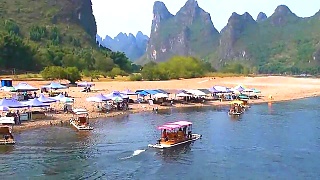
ZhangJiaJie 张家界 (HuNan) and HuaShan 华山 (ShaanXi) ... XingPing 兴平 and the Li River 漓江 (GuangXi) ... Xi'An 西安 (ShaanXi) and BeiJing 北京 ... LuoYang 洛阳 (HeNan) and PingYao 平遥 (ShanXi) ...
NanNing 南宁 - beautiful, green city
A vacation among the rice terraces of Ping'An 平安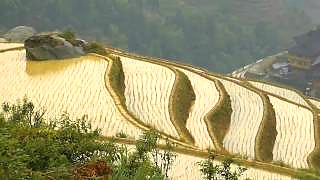
A beautiful film ... The LongSheng (Dragon's Backbone) rice terraces 龙胜梯田 cover an area of around 65 square kilometers (about 16,000 acres) in GuangXi province. Construction of the terraces began during the Yuan dynasty (1271-1368), most extensively around 500 years ago during the Ming dynasty, and continues today. The rice terraces stand as testament to the wisdom and strength of the Zhuang and Yao ethnic minorities who form the majority of the locals here. LongJi (the Dragon's Backbone) Mountain is located in LongSheng County, about 100 km (2 hours drive) from GuiLin. The most famous of the rice terrace areas here are the Ping'An and JinKeng rice terraces. The terraced fields are constructed from riversides up to the mountain tops, at elevations of 300 meters (1,000 feet) to 1,100 meters (3,600 feet). A typical incline is 30 to 35 degrees. This area is also noted for its LongJi tea and wine. Best time to visit : May to mid-October (ideally, June to September).
A beautiful pictorial film of the southern province ...
Beautiful YangShuo 阳朔 and GuiLin 桂林 from the air
The beautiful karst landscape around GuiLin 桂林
Around YangShuo 阳朔 and GuiLin 桂林
GuangXi province.
The Li River and YuLong River, between YangShuo and Guilin, GuangXi province
Near YangShuo and GuiLin, GuangXi province ...
The famous karst peaks of GuangXi province. Countryside views ... YuLong River bamboo rafting ... Li River cruise ...
China 中国 from the air - a breathtaking journey ...
These amazing films capture the beauty of nature and city ... Don't miss it ! The best videographers. The best music. Turn up the volume; relax; let's go ... Hong Kong The Great Wall (JinShanLing / SiMaTai, close to Beijing) QingHai province JiuZhaiGou and HuangLong, SiChuan province Crescent Moon Spring / Lake, 6 km from DunHuang, GanSu province, north west China Guilin and YangShuo, GuangXi province The Tibetan Plateau, far south west China HuiZhou, GuangDong province, south east China TianShan Mountain area, XinJiang province, far west China MoGao Grotto, YuMenGuan, YangGuan, JiaYuGuan, YaDan, DanXia; all in GanSu province Tian Tan Giant Buddha, Hong Kong GuangZhou, provincial capital of GuangDong and close to Hong Kong Various places in China
The NanNing 南宁 metro underground train system
Bonus film - South Village in NanNing ...
Beautiful GuangXi 广西 province by aerial drone ...
An awesome film - don't miss it ...
Exploring YangShuo 阳朔, GuangXi province
Bonus films - Great Wall of China trip, a glimpse of ShenZhen, and NanJing ...
印象桂林 GuangXi province, south China. Awesome, beautiful landscapes and culture ... Amazing CGI.
The magical scenery of GuangXi 广西 - from GuiLin 桂林 to YangShuo 阳朔
Sailing along the Li River and YuLong River, among beautiful karst mountain peaks ... Bonus films - starting with 'Let life be beautiful' ... Sung by Alu Azhou and the Mountain Wind Group 阿鲁阿卓, 山风组合 生如夏花. Inspired by Stray Birds by famous Indian poet Rabindranath Tagore, 1916 (生如夏花之绚烂,死如秋叶之静美 --飞鸟集, 泰戈尔, 1916). Lyrics and Music by PU Shu (朴树). "In this life, we can not stay so long ..." Plus, heading to the northern grasslands, Song of the Surging Water - title song of the 2015 movie Wolf Totem 汪峰 沧浪之歌(《狼图腾》主题曲). Sung by Wang Feng. Lyrics by WANG Feng (汪峰); music by Adam HUANG (HUANG Yong, 黄勇); with Alianuul (Morin Khuur solo) and NING FangLiang (violin solo). "I am broken, but I love flying ..." We are not here so long - let each day be full of love and beauty ...
Beautiful YangShuo 阳朔, GuangXi province - aerial footage
'A chance meeting in GuiLin 桂林' - and more micro movies 微电影
Grab some popcorn and enjoy a night-in at the BeiJingBuzzz cinema. New love, love perturbed, love re-found, love passed ... 'Fate ?' 《天目湖漫生活》 远离喧嚣 追寻宁静 世外桃园 浪漫生活 风景片 'Love More' Bii 畢書盡 《LOVEMORE CuBii 愛神降臨》 微電影全球首播 《连云港渔湾》微电影 山上的特别美丽魅力风景(爱情) 'Let's Get Married' (2015) Title song by Jane Zhang 張靚穎 《咱們結婚吧》 電影版主題曲《終於等到你》 (短版 MV) We cannot decide all that happens in life, but we can control how we react. Love is there, if we are ready and open the door. Love is not hard to find (to be); but it is easy to lose. In the end, what we get counts for nothing; it is what we give (leave behind) that matters - and every moment leaves a ripple in the ocean of life. Sneakers are fine; but the bare-foot memories will be most chrished. Love doesn't just flow to the naturally beautiful; it is those with love in their hearts who shine ; it is love that creates beauty.
Exploring LiuZhou 柳州 and the surrounding countryside, GuangXi province
DaXin County, GuangXi 广西 province - karst peaks near MingShi and DeTian Falls
Near / on the border with Vietnam ...
LiuZhou 柳州 city, GuangXi province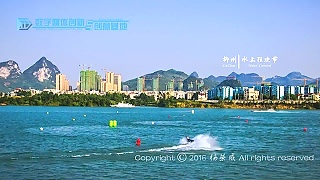
Li River 漓江 boat trip : Guilin to YangShuo; GuangXi province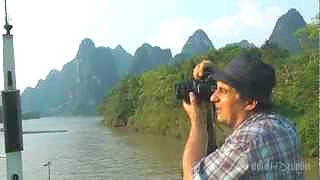
Beautiful JingXi 靖西, GuangXi province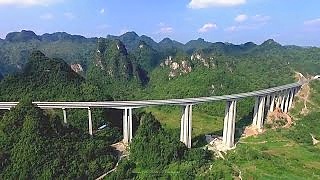
Near the border with Vietnam.
Cycling and bamboo rafting near YangShuo 阳朔, GuangXi province
The Li River 漓江 and YangShuo 阳朔 trip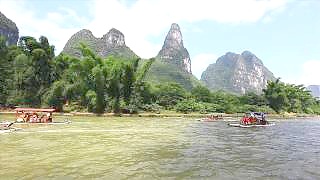
The town 'where nobody is a stranger' ...
A week in and around YangShuo 阳朔
GuangXi province. Including the LongJi rice terraces.
Beautiful aerial shots of the rice terraces and karst peaks of GuangXi province, plus the communal Tulou residences in FuJian province ...
Beautiful bamboo rafting on the YuLong River 遇龙河
The peaceful YùLóng Hé between YangShuo and GuiLin, GuangXi province, south China ...
The beautiful DeTian waterfalls 德天瀑布 area, GuangXi province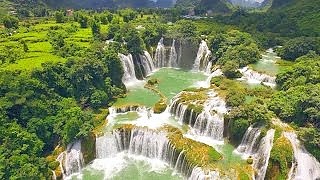
DéTiān PùBù, 'Virtuous Heaven Waterfall', is Asia's largest and easily viewed by walkways and boat. The waterfalls lie in the south of GuangXi province on the border with Vietnam. There are buses from NanNing, the provincial capital.
The beautiful YuLong River 遇龙河, YangShuo to Guilin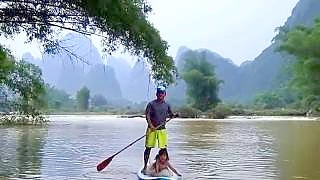
The YuLong River, YùLóng Hé, starts in YangShuo County near Litang and flows for over 35 kilometers (22 miles) to the Li River near the town of Ping Le; GuangXi province. The YuLong River is relatively shallow at around 5 meters (16 feet) maximum depth and is an average of 25 meters (82 feet) across. Unlike the deeper Li River, it has no motorized boat traffic and bamboo rafts, paddle boats and swimming are popular. The bamboo raft journey begins at the YuLong Bridge, which is 400 years old. Hiking and biking are also popular as there are many quaint villages along the river, some offering bed and breakfast accommodation. The YuLong River Valley is very fertile, and its low-lying terrain is excellent for rice fields. In recent years, farmers have also planted more cash crops such as pomelos, tangerines and mandarin oranges.